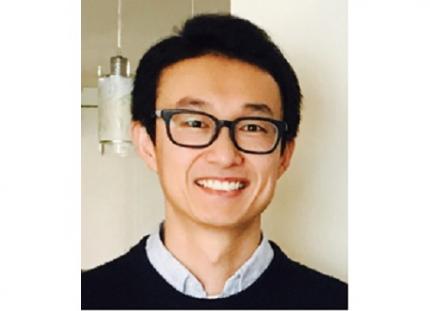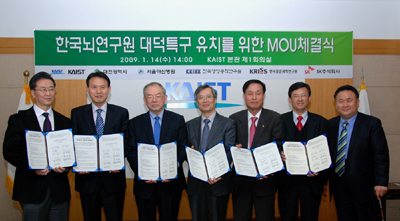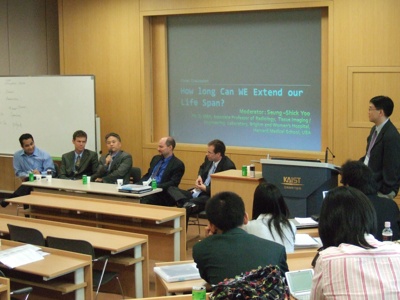brain+science
-
 Prof. Sang Wan Lee Selected for 2021 IBM Academic Award
Professor Sang Wan Lee from the Department of Bio and Brain Engineering was selected as the recipient of the 2021 IBM Global University Program Academic Award. The award recognizes individual faculty members whose emerging science and technology contains significant interest for universities and IBM.
Professor Lee, whose research focuses on artificial intelligence and computational neuroscience, won the award for his research proposal titled A Neuroscience-Inspired Approach for Metacognitive Reinforcement Learning. IBM provides a gift of $40,000 to the recipient’s institution in recognition of the selection of the project but not as a contract for services.
Professor Lee’s project aims to exploit the unique characteristics of human reinforcement learning. Specifically, he plans to examines the hypothesis that metacognition, a human’s ability to estimate their uncertainty level, serves to guide sample-efficient and near-optimal exploration, making it possible to achieve an optimal balance between model-based and model-free reinforcement learning.
He was also selected as the winner of the Google Research Award in 2016 and has been working with DeepMind and University College London to conduct basic research on decision-making brain science to establish a theory on frontal lobe meta-enhance learning.
"We plan to conduct joint research for utilizing brain-based artificial intelligence technology and frontal lobe meta-enhanced learning technology modeling in collaboration with an international research team including IBM, DeepMind, MIT, and Oxford,” Professor Lee said.
2021.06.25 View 14908
Prof. Sang Wan Lee Selected for 2021 IBM Academic Award
Professor Sang Wan Lee from the Department of Bio and Brain Engineering was selected as the recipient of the 2021 IBM Global University Program Academic Award. The award recognizes individual faculty members whose emerging science and technology contains significant interest for universities and IBM.
Professor Lee, whose research focuses on artificial intelligence and computational neuroscience, won the award for his research proposal titled A Neuroscience-Inspired Approach for Metacognitive Reinforcement Learning. IBM provides a gift of $40,000 to the recipient’s institution in recognition of the selection of the project but not as a contract for services.
Professor Lee’s project aims to exploit the unique characteristics of human reinforcement learning. Specifically, he plans to examines the hypothesis that metacognition, a human’s ability to estimate their uncertainty level, serves to guide sample-efficient and near-optimal exploration, making it possible to achieve an optimal balance between model-based and model-free reinforcement learning.
He was also selected as the winner of the Google Research Award in 2016 and has been working with DeepMind and University College London to conduct basic research on decision-making brain science to establish a theory on frontal lobe meta-enhance learning.
"We plan to conduct joint research for utilizing brain-based artificial intelligence technology and frontal lobe meta-enhanced learning technology modeling in collaboration with an international research team including IBM, DeepMind, MIT, and Oxford,” Professor Lee said.
2021.06.25 View 14908 -
 KAIST College of Life Sciences and Bioengineering Signs MOU with Harvard
KAIST’s College of Life Sciences and Bioengineering recently signed a memorandum of understanding (MOU) with Harvard University’s Center for Brain Science on July 20, which will allow for joint research and exchange in researchers between the two institutions.
Headed by Director Kenneth Blum, Harvard’s Center for Brain Science leads the world in brain-related research. The new MOU will allow for research cooperation, exchanges of professors, researchers, and students, joint usage of infrastructure and research materials, and finally, sharing of research assignments.
The Dean of the College of Life Sciences and Bioengineering Sang Yup Lee, who concerted efforts to form the MOU said, “This agreement will bring together two of the world’s leading brain-related research teams, and I hope that combining their expertise will bring great advances in brain science and engineering.
KAIST’s College of Life Science and Bioengineering, which is known for its creative interdisciplinary research, is producing exemplary research results in the field of brain science from its Biological Sciences and Bio and Brain Engineering departments.
In addition to cooperation with Harvard, KAIST has also formed partnerships with Emory University, Japan’s RIKEN Brain Institute, and Germany’s Max Planck Institute. Not only does it have a worldwide network pertaining to brain research, but KAIST has also engaged in cooperative research with prominent domestic institutions such as, Asan Medical Center, the Korea Research Institute of Bioscience and Biotechnology, the Korea Research Institute of Standards and Science, and the SK Corporation. Through these connections, KAIST has managed to lead in mutually cooperative brain interdisciplinary research.
2009.08.10 View 20335
KAIST College of Life Sciences and Bioengineering Signs MOU with Harvard
KAIST’s College of Life Sciences and Bioengineering recently signed a memorandum of understanding (MOU) with Harvard University’s Center for Brain Science on July 20, which will allow for joint research and exchange in researchers between the two institutions.
Headed by Director Kenneth Blum, Harvard’s Center for Brain Science leads the world in brain-related research. The new MOU will allow for research cooperation, exchanges of professors, researchers, and students, joint usage of infrastructure and research materials, and finally, sharing of research assignments.
The Dean of the College of Life Sciences and Bioengineering Sang Yup Lee, who concerted efforts to form the MOU said, “This agreement will bring together two of the world’s leading brain-related research teams, and I hope that combining their expertise will bring great advances in brain science and engineering.
KAIST’s College of Life Science and Bioengineering, which is known for its creative interdisciplinary research, is producing exemplary research results in the field of brain science from its Biological Sciences and Bio and Brain Engineering departments.
In addition to cooperation with Harvard, KAIST has also formed partnerships with Emory University, Japan’s RIKEN Brain Institute, and Germany’s Max Planck Institute. Not only does it have a worldwide network pertaining to brain research, but KAIST has also engaged in cooperative research with prominent domestic institutions such as, Asan Medical Center, the Korea Research Institute of Bioscience and Biotechnology, the Korea Research Institute of Standards and Science, and the SK Corporation. Through these connections, KAIST has managed to lead in mutually cooperative brain interdisciplinary research.
2009.08.10 View 20335 -
 Six Organizations Join Forces to Induce Projected National Brain Institute to Daejeon
Six major organizations including KAIST have joined forces to help Daejeon City to win the government approval to build the envisioned Korean Brain Institute in Daedeok Research Complex.
The six organizations signed a memorandum of understanding on cooperating in establishing the government-funded institute built within the Daedeok Research Complex in the city of Daejeon, at KAIST on Jan. 14. The six organizations are KAIST, the Daejeon City Government, Korea Research Institute of Bioscience and Biotechnology, Korea Research Institute of Standard and Science, Asan Medical Center, and SK Corp., a pioneer in effective therapeutic invention for serious brain disorders.
The partnership of the six organizations is expected to bring a broad-based cooperation opportunities and create a massive synergy effect in the brain science researches and the development of new therapeutic treatment for brain disorders by combining their resources and infrastructures.
The six organizations have also built an international research network with such globally-renowned brain research institutions as RIKEN, a large natural sciences research institute in Japan, Max Plank Institute in Germany, Federal Institute of Technology, Lausanne, in Switzerland and Brain Research Institute of University of Queensland in Australia. The research network is under the support and guidance of Dennis Choi, a prominent neuroscientist who once served as the President of the Society for Neuroscience and is currently a professor in the Departments of Neurology and biology at Emory University.
The tentatively titled Korea Brain Institute is envisioned to help fight brain disorders and create Korea"s new growth engine, as well as lengthening life span, by conducting convergence researches in nero science, brain science and pharmacology. If the consortium of the six organizations wins the government approval to build the proposed institute within the Daedeok complex, the central government and the Daejeon city government are expected to pour a total of 329.7 billion won into the project by 2020.
2009.01.14 View 21389
Six Organizations Join Forces to Induce Projected National Brain Institute to Daejeon
Six major organizations including KAIST have joined forces to help Daejeon City to win the government approval to build the envisioned Korean Brain Institute in Daedeok Research Complex.
The six organizations signed a memorandum of understanding on cooperating in establishing the government-funded institute built within the Daedeok Research Complex in the city of Daejeon, at KAIST on Jan. 14. The six organizations are KAIST, the Daejeon City Government, Korea Research Institute of Bioscience and Biotechnology, Korea Research Institute of Standard and Science, Asan Medical Center, and SK Corp., a pioneer in effective therapeutic invention for serious brain disorders.
The partnership of the six organizations is expected to bring a broad-based cooperation opportunities and create a massive synergy effect in the brain science researches and the development of new therapeutic treatment for brain disorders by combining their resources and infrastructures.
The six organizations have also built an international research network with such globally-renowned brain research institutions as RIKEN, a large natural sciences research institute in Japan, Max Plank Institute in Germany, Federal Institute of Technology, Lausanne, in Switzerland and Brain Research Institute of University of Queensland in Australia. The research network is under the support and guidance of Dennis Choi, a prominent neuroscientist who once served as the President of the Society for Neuroscience and is currently a professor in the Departments of Neurology and biology at Emory University.
The tentatively titled Korea Brain Institute is envisioned to help fight brain disorders and create Korea"s new growth engine, as well as lengthening life span, by conducting convergence researches in nero science, brain science and pharmacology. If the consortium of the six organizations wins the government approval to build the proposed institute within the Daedeok complex, the central government and the Daejeon city government are expected to pour a total of 329.7 billion won into the project by 2020.
2009.01.14 View 21389 -
 Int'l Conference for Integration of Science & Technology into Society Opens
The 2008 International Conference for the Integration of Science and Technology into Society (ICISTS-KAIST) opened a four-day meeting on Tuesday (July 15) at Daejeon KAIST campus. The conference is an annual event organized by a group of KAIST undergraduate students.
The fifth-year gathering is designed to provide participants with an opportunity to broaden their scientific perspectives by sharing ideas and experiences in related topics, as well as building an international human network. This year"s event has drawn about 200 students from 40 countries.
The centerpiece of the conference is three workshops on the following themes; Human-Robot Symbiotic Society, Neo-brain Science and Trafficmatics. Myung-Ja Kim, former Korean Environment Minister, will appear as a keynote speaker.
In the workshop sessions, two speakers will discuss specific issues and arrive at a tentative conclusion. Participants will have the opportunity to participate in the debate through Q&A for each session.
The first theme "Human-Robot Symbiotic Society" delves into the current trend that robot is being transformed into a perceivable and touchable concept from an abstract one. Guests for the workship include June-Ho Oh, professor at the Department of Mechanical Engineering, KAIST; James Dater, professor at the Department of Political Science, University of Hawaii at Manoa, and Director of the Hawaii Research Center for Future; Michael Pollitt, CEO of Shadow Robot Company; and Steven Dubowsky, professor at the Department of Mechanical Engineering, MIT.
The second theme "Neo-Brain Science" focuses on attempts to shed light on brain from diverse perspectives including psychology, economics and art. Among invited speakers are Prof. Jai-Seung Jung at the Department of Bio and Brain Engineering, KAIST; Prof. Un-Jung Kang at the University of Chicago Medical Center; and Peter Geyer, a consultant for the Association for Psychological Type.
The third workshop on "Traffimatics" will deal with "intelligent transport systems (ITS)" which will discusst new paradigm in transportation policy and traffic engineering. On the list of speakers are Assaf Biderman, assistant director, SENSEable City Laboratory, MIT; Prof. Richard Tay, at the Department of Civil Engineering, University of Calgary; Prof. Shoshi Mizokami at Kumamoto University; and Ho-Jong Baik, research associate professor of Virginia Tech.
2008.07.16 View 24019
Int'l Conference for Integration of Science & Technology into Society Opens
The 2008 International Conference for the Integration of Science and Technology into Society (ICISTS-KAIST) opened a four-day meeting on Tuesday (July 15) at Daejeon KAIST campus. The conference is an annual event organized by a group of KAIST undergraduate students.
The fifth-year gathering is designed to provide participants with an opportunity to broaden their scientific perspectives by sharing ideas and experiences in related topics, as well as building an international human network. This year"s event has drawn about 200 students from 40 countries.
The centerpiece of the conference is three workshops on the following themes; Human-Robot Symbiotic Society, Neo-brain Science and Trafficmatics. Myung-Ja Kim, former Korean Environment Minister, will appear as a keynote speaker.
In the workshop sessions, two speakers will discuss specific issues and arrive at a tentative conclusion. Participants will have the opportunity to participate in the debate through Q&A for each session.
The first theme "Human-Robot Symbiotic Society" delves into the current trend that robot is being transformed into a perceivable and touchable concept from an abstract one. Guests for the workship include June-Ho Oh, professor at the Department of Mechanical Engineering, KAIST; James Dater, professor at the Department of Political Science, University of Hawaii at Manoa, and Director of the Hawaii Research Center for Future; Michael Pollitt, CEO of Shadow Robot Company; and Steven Dubowsky, professor at the Department of Mechanical Engineering, MIT.
The second theme "Neo-Brain Science" focuses on attempts to shed light on brain from diverse perspectives including psychology, economics and art. Among invited speakers are Prof. Jai-Seung Jung at the Department of Bio and Brain Engineering, KAIST; Prof. Un-Jung Kang at the University of Chicago Medical Center; and Peter Geyer, a consultant for the Association for Psychological Type.
The third workshop on "Traffimatics" will deal with "intelligent transport systems (ITS)" which will discusst new paradigm in transportation policy and traffic engineering. On the list of speakers are Assaf Biderman, assistant director, SENSEable City Laboratory, MIT; Prof. Richard Tay, at the Department of Civil Engineering, University of Calgary; Prof. Shoshi Mizokami at Kumamoto University; and Ho-Jong Baik, research associate professor of Virginia Tech.
2008.07.16 View 24019